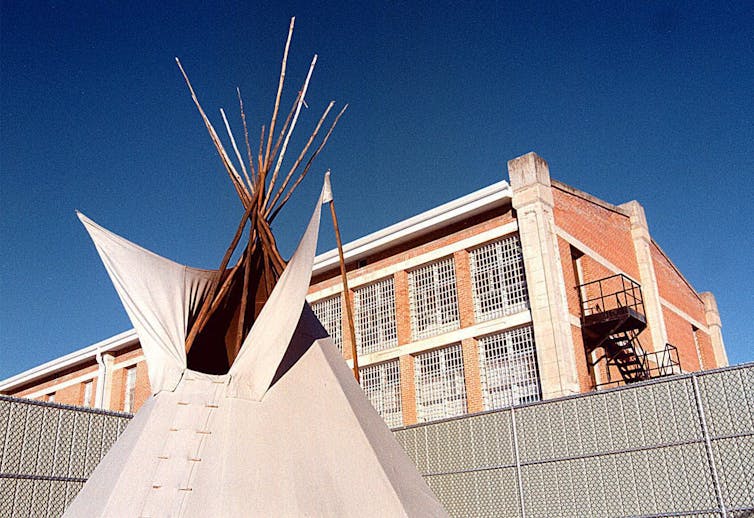The Conversation
Indigenous women, transgender and Two-Spirit people need support when leaving prison
April 11, 2021
Share

WeŌĆÖre all aware of how the ŌĆö but why isnŌĆÖt more attention being paid to the relationship between COVID-19 and the criminal justice system, specifically how itŌĆÖs .
 The start of the pandemic came with the . Since then, numerous front-line workers and community organizations have to ensure that the people being released have co-ordinated plans and supports in place.
The start of the pandemic came with the . Since then, numerous front-line workers and community organizations have to ensure that the people being released have co-ordinated plans and supports in place.
Unfortunately, the government , inadvertently placing all released inmates at risk of , and even .
Kevin Walby, an associate professor of criminal justice at the University of Winnipeg, said itŌĆÖs like the provincial government just ŌĆ£.
Institutions currently facing outbreaks:
TSDC
TEDC
Vanier Centre for Women
Hamilton Detention Center
Thunder Bay District Jail & Correctional Centre
Elgin Middlesex Detention Centre
Central East & North Correctional Center
Sarnia Jail
OCDC
Stratford Jail (temporarily closed)ŌĆö Toronto Prisoners' Rights Project (@letstalkjails)
A failure to follow through
We have witnessed how the Ontario government has on their promises to end violence against Indigenous people.
As a doctoral student who has volunteered with women and youth in and out of prisons, and an Anishinaabe midwife and assistant professor, we have heard first-hand how dire this crisis is. Staff at have told us that theyŌĆÖve waited more than eight hours for women scheduled to be released from the Vanier Centre for Women in Milton, Ont., and that some were released as late as 10:30 p.m. with no access to transportation or accommodation.
The 2019 (MMIWG) highlighted how Indigenous women, girls and people leaving prison can become entrapped in a cycle of incarceration. They are often victimized by traffickers who use the prison system to target, lure and exploit those who donŌĆÖt have access to housing or transportation.
Despite the to respond to the , it continues to release Indigenous women into precarious situations without resources for a safe passage to their families or communities.
To release anyone, is irresponsible, dangerous and does not demonstrate a commitment to reconciliation.
Doing nothing has consequences
One tragic example of the consequences of these systemic failures is the . On Jan. 23, 2021, Squirrel was found frozen to death in Saskatoon just three days after being released from a provincial correctional facility; no one in her family was notified of her release and her death was entirely preventable.
Indigenous transgender and Two-Spirit people have . The on transgender and Two-Spirit communities further highlights the importance of providing supports upon release.
It is only a matter of time before someone else is harmed ŌĆö or even killed ŌĆö as a direct result of the provincial governmentŌĆÖs inefficiency and disregard for implementing appropriate measures for the safe release of Indigenous women, transgender and Two-Spirit people.
We need to decriminalize, decarcerate & decolonize. Start by questioning why she was in jail when she was seeking treatment, housing & support. Enough tiny bandaids on these festering systems. Ōü”Ōü® -22 to make it fit for purpose!
ŌĆö Kim Pate (@KPateontheHill)
Enough is enough
The urgency of these issues is further underscored by COVID-19 and its . Without re-entry plans, adequate safety measures and communication in place, individuals are released into precarious circumstances. Without access to accommodation or transportation, they may be unable to safely self-isolate to prevent the spread of the virus.
In an to the Ministry of the Solicitor General, we ŌĆö as part of a collective of community members, Elders, Healers, front-line workers, researchers, educators and students who advocate for the rights of Indigenous Peoples in the Canadian criminal justice system ŌĆö have called upon the Ontario government to:
- Develop and release re-entry plans for all inmates, including provisions for adequate financial and transitional supports.
- Publicly release current policies and measures in place for the safe release of all ŌĆö including Indigenous women, transgender and Two-Spirit people.
- Publicly release COVID-19 safety measures for individuals prior to and upon release from correctional institutions.
Against the advice of and advocates, Ontario continues to incarcerate people at an . Provincial and federal governments must be held accountable for the harms that their inaction and blatant maleficence has caused.
Indigenous women, transgender and Two-Spirit people deserve to be treated with respect ŌĆö both inside and outside of prison.
We offer our most sincere condolences to the family and friends of Kimberly Squirrel.![]()
________________________________________________
, PhD Student, Dalla Lana School of Public Health, and , Assistant Professor, Department of Gender Studies,
This article is republished from under a Creative Commons license. Read the .
The Conversation is seeking new academic contributors. Researchers wishing to write articles should contact Melinda Knox, Associate Director, Research Profile and Initiatives, at knoxm@queensu.ca.



